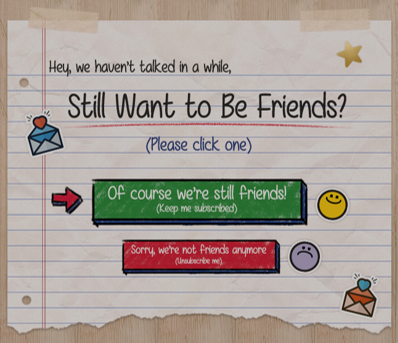Personalized Marketing: Don’t Make It Weird
Personalized marketing is a great way to connect with your audience. From personalization in email greetings and landing pages to tailored promotions and product recommendations, it allows you to provide a more customized, contextual and relevant brand experience that is mutually beneficial.
 But personalized marketing can also make people really uncomfortable—especially in this er a of heightened concern about the privacy and usage of our individual data. Seventy-five percent of respondents to a recent study about marketing personalization stated that they find some types of personalized marketing “creepy.” So where do you draw the line?
But personalized marketing can also make people really uncomfortable—especially in this er a of heightened concern about the privacy and usage of our individual data. Seventy-five percent of respondents to a recent study about marketing personalization stated that they find some types of personalized marketing “creepy.” So where do you draw the line?
Mind Readers
Retargeting (that’s the technical term for when an ad for a product or service you’ve researched online follows you from website to website—or sometimes even device to device) probably freaked you out a little at first. But now it’s such a common type of personalized marketing that it may not even faze you anymore. But what about those times when all you’ve done is talk about a product, and suddenly there are ads for it in your social media and pretty much any site you visit? It happens frequently enough that you may think your phone is listening to you. Companies like Facebook and Google deny “ambient listening,” so it’s doubtful that’s what is happening. But it’s not any less scary to know that there is enough data collected from you (and others like you) that the algorithms behind this technology understand you well enough to make it seem like they’re reading your mind.
Stalkers
Tools like marketing automation and email service providers make it easy to collect data from people who interact with your brand. Metrics like open rates and click-through rates are great ways to measure the effectiveness of your marketing. Setting up a segmented drip campaign is a sophisticated way to nurture people who aren’t ready to buy from you and further engage those who are. But it’s one thing to send a relevant follow-up email to somebody who opened an email and clicked a link…and another thing entirely to send someone who opened your email something like this:
Personalized Marketing Misfires
Our Account Manager Leah recently placed an order online. Immediately after creating an account, she received the following email from the company:
From the form she completed online, they had all the information necessary for a nice personalized marketing piece: her name, email and recent order details. What could have been an opportunity to thank her (by name!) for being a new customer (and maybe give her a discount code for a future purchase) turned into an off-putting and decidedly unpersonal brand experience.
The bottom line is, make your marketing personal…but not too personal.

